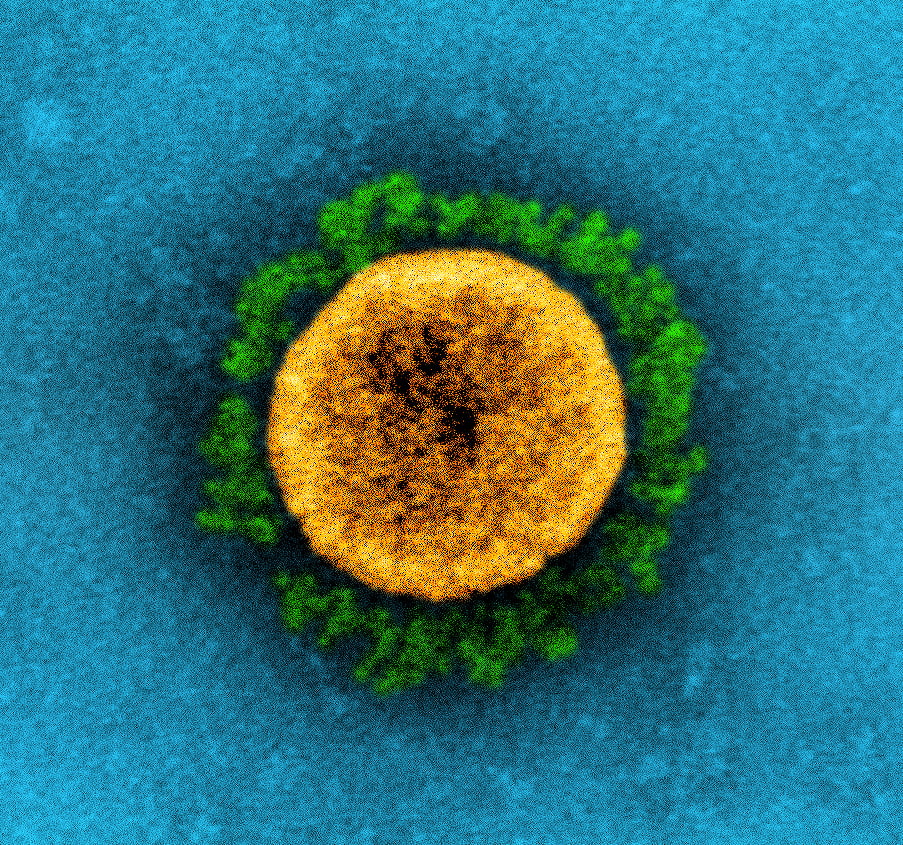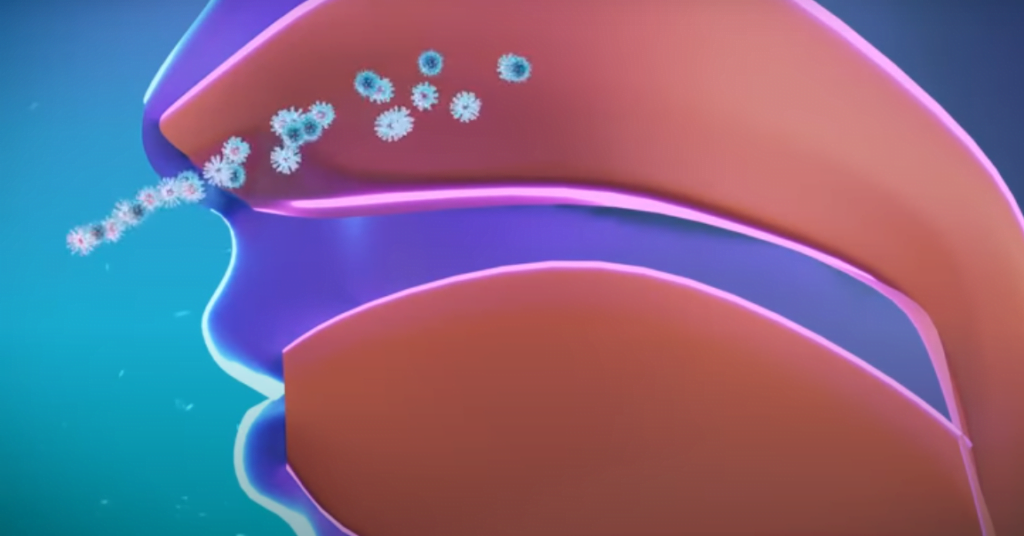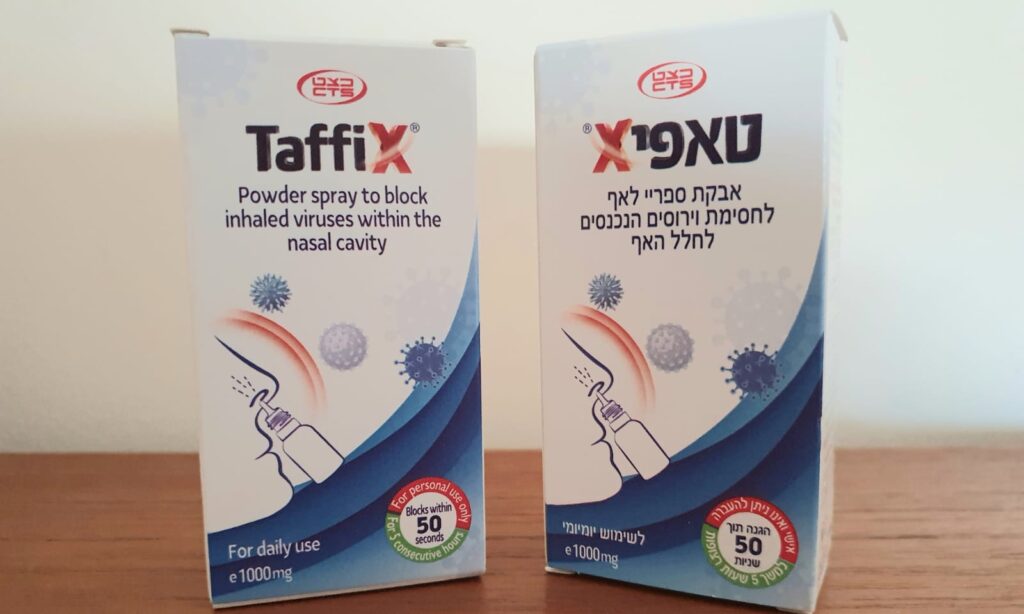An Israeli biopharmaceutical company developing powder-based intranasal products announced this week that a spray made by the firm proved highly effective in lab tests against two prominent coronavirus variants, according to the findings of a new study. The spray was previously found to effectively reduce the spread of SARS- CoV-2, the virus that causes COVID-19, in a real-world trial last year.
Nasus Pharma said that in a new collaborative study with the Central Virology Laboratory at the Israeli Ministry of Health and the Sheba Medical Center at Tel Hashomer Hospital, the company’s proprietary Taffix spray “blocked 100 percent” of the two new variants of SARS-CoV-2 virus, the British variant, also known as B.1.1.7, and the South African variant.
The British variant was found in a new study at Tel Aviv University to be 45 percent more contagious than the original virus.
SEE ALSO: Keeping COVID-19 Out: Israeli Tech To Purify Indoor Air Could Be A Game-Changer
In the in vitro study by Nasus, the gel layer produced by Taffix in a tissue culture infected with doses of the virus variants was effective at blocking them, as demonstrated by PCR testing of the cells.

The company did not give further details about the study nor did it indicate when it was conducted, whether the findings were published, or whether further studies were in the offing.
Nasus Pharma CEO Dr. Dalia Megiddo said in a statement that the results “conform with prior in vitro studies performed with Taffix where 99.99 percent of SARS- CoV-2 viruses were blocked by Taffix, as well as other viruses known to cause upper respiratory infections.”
Nasus said that it is now well established that the nasal cavity is the main gateway to the body of airborne droplet viral infection including SARS-COV-2, and the Taffix powder creates a thin acidified gel above the nasal mucosa that shields the nasal cells from inhaled viruses through both mechanical and chemical protection. The gel lasts five hours and could be used as an additional layer of protection against infection, Nasus Pharma indicated.
The results of the latest study, said Dr. Megiddo, are “consistent with real-life clinical experience with Taffix where the risk of contracting COVID was reduced by 78 percent following a ‘super spreader’ event.”
Dr. Meggido is referring to a separate study last year during Rosh Hashanah where the spray appears to have contributed to a reduced COVID-19 infection rate among ultra-Orthodox members of a synagogue in Bnei Brak.
At the time, in September 2020, Israel was a world leader in the number of new COVID-19 cases per one million citizens and the rate of infection in ultra-Orthodox communities was double. The mortality rate was also higher. Before Rosh Hashanah, Bnei Brak’s positivity rates for COVID-19 were 17.6 percent, climbing to 28.1 percent two weeks later, the study showed.
Ahead of the approaching holiday, characterized by mass gatherings at synagogues for prayers and family events, there were concerns about such events becoming sources of mass outbreaks. Nasus approached a synagogue community of 243 members in Bnei Brak and made available bottles of the spray to use during the holiday and thereafter.
A total of 83 worshipers used the spray before Rosh Hashanah prayers and for the following two weeks according to instructions, and just two contracted the virus in a real-world test of the product, the company said. The two who contracted the virus did not use the spray as instructed and the remaining members did not use the spray at all, according to surveys conducted for the study.
That study was conducted in partnership with scientists from the University of Haifa, the University of Virginia, and the Hadassah Medical Center in Jerusalem. Preprints were available in November 2020 and in January 2021, and the full study was published after peer-review in recent weeks.
Sign up for our free weekly newsletter
Subscribe“Given the excellent safety profile of Taffix and its statistically significant efficacy in preventing infection following what is defined as high-risk infection event — it seems that this additional layer of protection can significantly reduce the risks of infection and may enable people to resume some part of their daily routine more safely,” the authors of the study wrote. They called for controlled clinical trials to more precisely define target populations and means of encouraging adherence.
Professor Yaakov Naparstek, the scientific director of the Meuhedet HMO Research Institute and a physician at Hadassah Medical Center who co-authored the study said that “the fact that Taffix was able to significantly reduce infection rate in users of the product is very encouraging.”

Dr. Megiddo said that the “consistent results across multiple virus strains prove the robust non-specific activity against the transmission of multiple respiratory viruses.”
“The study’s results reconfirm the versatility of our technology against various respiratory viruses including SARS-CoV-2 and its new variants and Taffix’s potential as an important additional layer of protection against infection,” she added.
SEE ALSO: How Israel’s Startup Nation Ethos Propelled Its World-Leading Vaccination Drive
Udi Gilboa, Chairman of the Board of Nasus Pharma added, that there was “an urgent need for solutions that enable resuming of economic and social activities safely. The changing dynamics of the virus and the continued appearance of additional mutations present a challenge to public health.”
“Our new data demonstrates that Taffix can be helpful in preventing the spread of these new variants in addition to all other recommended safety measures,” he said.
Taffix is available in Israel and is also currently sold in over 20 countries across Europe, Latin America, Asia and Middle East, the company said.
Nasus Pharma is based in Tel Aviv and is also developing a number of intranasal products aimed at assisting patients in several acute emergency situations such as opioid overdose and anaphylactic shock.
It is not the only company in the market touting a spray-based solution to fighting COVID-19 infection. SaNOtize, the company behind a proposed antiviral nasal spray for use against COVID-19 has started a production line in Israel where the Health Ministry gave its interim approval for the sale of the product to people over 12 years of age.
The company, co-founded by Israeli-Canadian scientist Dr. Gilly Regev and based in Vancouver, developed a patented platform technology that allows for the topical delivery of nitric oxide (a naturally occurring nanomolecule with the formula NO, hence the name) to treat a variety of bacterial, fungal, and viral diseases.
The company’s Nitric Oxide Nasal Spray (NONS), under the brand name Enovid, is designed to kill SARs-CoV-2, the virus that causes COVID-19, in the upper airways, preventing it from incubating and spreading to the lungs. The spray is undergoing clinical trial in the UK and is currently in Phase II prevention and efficacy trial in Canada.
SEE ALSO: SaNOtize Begins Production Of Anti-COVID Nasal Spray In Israel
Related posts

Israeli Medical Technologies That Could Change The World

Harnessing Our Own Bodies For Side Effect-Free Weight Loss

Missing Protein Could Unlock Treatment For Aggressive Lung Cancer




Facebook comments